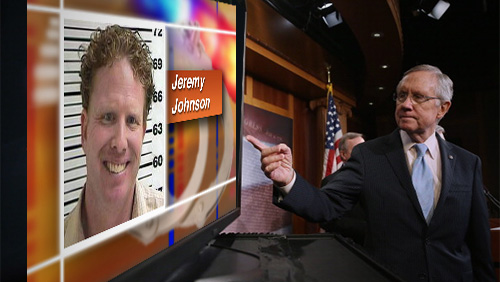 News emerged late last week that Utah state prosecutors have engaged the assistance of agents from the Federal Bureau of Investigation in a wide-ranging corruption probe after the Department of Justice declined to launch a full federal investigation into accusations that Sen. Harry Reid (D-NV) and Sen. Mike Lee (R-UT) peddled influence from their high political offices.
News emerged late last week that Utah state prosecutors have engaged the assistance of agents from the Federal Bureau of Investigation in a wide-ranging corruption probe after the Department of Justice declined to launch a full federal investigation into accusations that Sen. Harry Reid (D-NV) and Sen. Mike Lee (R-UT) peddled influence from their high political offices.
Back in 2011, Reid worked to get Lee’s chief counsel confirmed as the U.S. Attorney for Utah – an unusual move in highly partisan Washington. That turn of events led directly to the state that the Utah corruption probe is in today: according to the Washington Times, the case has become complicated because all the federal prosecutors in Utah had to recuse themselves due to a potential conflict of interest between one of the prosecutors and a subject of the probe. Now two state prosecutors are being left to pursue the case on their own at the state level with the assistance of FBI agents, a rare but not unprecedented move.
Davis County prosecutor Troy Rawlings told the Times that he and Sim Gill, the prosecutor in Salt Lake County, plan on “formally turning attention to all of the scraps picked up about” Reid and Lee. The focus for Lee is on a house he sold to a campaign contributor at a massive loss that was absorbed by his mortgage bank. With Reid, the charges are linked to his move to his reversal of opinion about online poker in the United States.
Johnson’s allegations regarding Harry Reid first came up in January 2013, when he told the Salt Lake Tribune that Utah’s then-Attorney General, John Swallow, helped broker a $600,000 deal that was supposedly made to get Reid to intervene in an FTC fraud investigation into Johnson’s business, Elite Debit, which processed online poker transactions for SunFirst Bank. Recent reports have Johnson admitting to cutting two checks, worth $200,000 and $50,000, to a company and a “personal friend” of Reid’s to help secure intervention in Johnson’s case. Weeks later he also suggested that the timing of Reid’s change of heart on the online poker issue in 2010 was due to a seven-figure check that Johnson wrote to a company on the West Coast. (Reid’s representatives note that the senator’s shift on online poker coincided with a similar change by the American Gaming Association.)
Johnson undercut his own credibility last year by admitting that he didn’t know if any of his money ever reached anyone connected with Reid. The current investigation has turned up cancelled checks to corroborate part of Johnson’s story, but that doesn’t really prove anything other than that Johnson believed he was paying for a valuable service. What it also doesn’t prove is that the valuable service even existed in the first place.
Even if it is true that Reid received money through intermediaries while he was changing his mind on online poker, is it really so shocking to think that a politician in the richest nation ever to exist can be influenced by money? Or that, given campaign finance regulations in America that grow ever more Byzantine by the year, he would employ a chain of middlemen to spare him the indignity of ever having to meet the mooks who wanted to buy influence with him? It’s a bit House of Cards, perhaps, but art imitates life just as often as life imitates art.
In the prospect of life imitating art, we have another possibility: that Jeremy Johnson was conned by a very clever insider. It’s not difficult to see how someone so desperate to shake the feds could have been taken for a ride by “intermediaries” who promised whatever Johnson wanted to hear, with no intention of ever passing money extorted from him along to Harry Reid. It sounds like something straight out of an Elmore Leonard novel. The timing of Reid’s change of heart on online poker was perfect, really, for an insider who might have seen an opportunity to make some cash while pulling one over on Johnson. He would be convinced that his payments did the trick, making him a lock to start singing his crazy-sounding story to anyone who would listen, and Reid’s people would immediately point out that Johnson faces a massive federal indictment and can’t be trusted – which is exactly what happened.
Given that Johnson’s accusations involve John Swallow, the idea that the desperate businessman might have been ripped off in his attempt to buy influence doesn’t feel particularly far-fetched. A Utah state special legislative committee last week concluded that Swallow may have broken as many as eight states laws during his 11-month tenure as the state’s attorney general, saying that he “compromised the principles and integrity of the office to benefit himself and his political supporters” and “hung a veritable ‘for sale’ sign on the office door that invited moneyed interests to seek special treatment and favors.” Maybe Swallow didn’t compromise his integrity at all – at least not with regard to Jeremy Johnson. Maybe he just thought it would be unethical to let a sucker like Johnson, who thought he could buy the Senate’s majority leader intervention into a federal investigation with a couple of six-figure checks, keep his money.